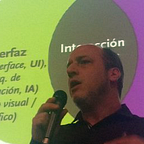The “UX Empathy”: gift or grift?
In the world of UX, there are those who claim to be ‘gifted’ with an exceptional sense of empathy. But scratch the surface, and you’ll often find a ‘grifter’ — selling the illusion of a skill they barely understand.
Every so often, I get to hear or read about some “gifted” UXer, recently enlightened by the grace of empathy, suggesting that we veterans who denounce how corporate bullshit has diluted the discipline are facing those situations because “we lack empathy”. Seriously.
To these innocent doves, empathy is not just some Hollywood hacking tool that works on people, but something that they have in abundance. If only we were as empathetic as they are, if we had the superpower of empathy, we’d just empathize with IT and Business, and understand them perfectly, and then rainbows would appear, unicorns would abound, and we’d have happiness — and above all, empathy.
An argument, of course, not based on validated experience — as should be expected from any true UX professional — but on what they feel. It’s nothing but smoke, a product of high juniority, ignorance, and the arrogance of having just discovered empathy a few weeks ago — like some adolescent revelation.
These pathetic cases of Dunning-Kruger have never encountered a really difficult manager. Not because such managers are rare (quite the opposite), but because these empathy-enlightened folks have never even been close to that table.
By “difficult manager”, I mean the typical product of a corporate fixture that, year after year, breeds and promotes the most psychopathic and manipulative employees. Then the most psychopathic and manipulative coordinators. From these semifinals, come the most psychopathic and manipulative bosses. Until the final: the epic showdown where the most polished products of this process stab each other in the back for the coveted Manager position.
In Peopleware (1999), Tom DeMarco vividly describes the ruthless psychopathy of these people:
Some years ago I was swapping war stories with the manager of a large project in southern California. He began to refate the effect that his project and its crazy hours had had on his staff. There were two divorces that he could trace directly to the overtime his people were putting in, and one of his worker’s kids had gotten into some kind of trouble with drugs, probably because his father had been too busy for parenting during the past year. Finally there had been the nervous break- down of the test team leader.
As he continued through these horrors, I began to realize that in his own strange way, the man was brag- ging. You might suspect that with another divorce or two and a suicide, the project would have been a com- plete success, at least in his eyes.
Back to the scenario I mentioned earlier: in the past 10 years, corporate bullshit has diluted our discipline. The solution offered by the Empaty Grifters? Well, more empathy for the cruel, psychopathic, and manipulative managers who have micromanaged and exploited with unpaid overtime every poor soul unlucky enough to cross their path.
The coffee grounds tell me UX empathy is your gift
The naïve and brutal disconnect between the empathy-enlightened and reality is something I’ve observed for a while now, and it’s only accelerated since the pandemic.
A bit of investigation shows that all these people were led to believe that the “secret weapon” of UX is “empathy.” They were made to think that with just a few exercises of “putting yourself in the user’s shoes,” they were now “UX professionals” and “ready.” They were made to think that by investing just a few hours, they had “arrived,” they had received enlightenment.
What they weren’t told is what “empathy” they were talking about. They weren’t told how to define it, how to evaluate it, how to test it. Like astrologers and charlatans, they threw out a quality that, to some degree, everyone has — and that everyone likes to hear they possess. And then, it “stuck.” As if that cheap Barnum statement was a profound truth.
From the perspective of usability engineering, a fundamental base of UX, that notion of “empathy” is nothing more than a vulgar and useless term — just as “intuitive” was 30 years ago.
In fact, I believe part of UX’s devaluation and the dumbing down of all its aspects is due to the growing ignorance in recent waves of UX practitioners about the engineering foundations our discipline draws upon. That pesky barrier to entry, which is easier to omit when selling a course to more people. But without it, what remains is like a drop of wine in a glass of water, and they still want you to believe it’s whiskey.
Iterating on a definition by Jef Raskin (the father of the Macintosh project), we can say that as the product of the intersection of design and engineering,
the true “secret weapon” of UX is the ability to carry out systematic work based on rational principles, capable of generating creative solutions grounded in evidence and validated by solid methods, so that their large-scale application works as expected.
Cultivating that ability requires discipline, practice, and integrity.
If we want to move past the decade of corporate bullshit diluting UX, we need to be professional and impeccable. If we want to design together the UX Renaissance decade, we need to stop talking about UX empathy for at least two years.
Follow me, the good ones! (in other words, like & subscribe)
